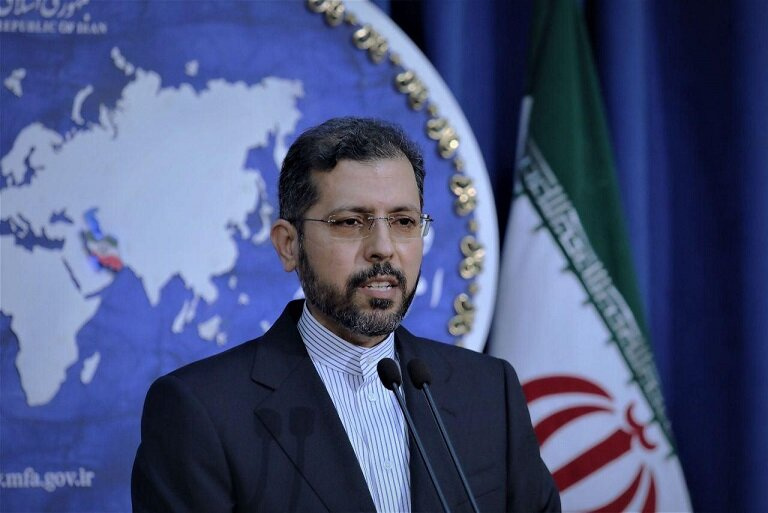Expiration of UN arms embargo a ‘major victory’: Iran

“It was a major victory for Iran and the resistance. What expired yesterday was a thirteen-year embargo on Iran and the termination of resolutions that our friends, Russia and China, have voted in favor of,” Katibzadeh was quoted by Fars news agency as saying.
Speaking at a weekly press conference, the spokesman added, “The arms restrictions on the Islamic Republic of Iran automatically expired last night at 03:30 am. And the Islamic Republic of Iran has once again succeeded in stopping the U.S. unilateralism. What we saw was a victory and achievement for Iran.”
According to the spokesman, during the nuclear negotiations between Iran and the P5+1, the Western and American side was not willing to discuss the UN arms embargo. But Iran insisted that it will not move forward with the negotiations if the arms embargo is excluded from the discussions.
Khatibzadeh said the details of the nuclear negotiations that culminated in the signing of the 2015 Iran nuclear deal - officially known as the Joint Comprehensive Plan of Action (JCPOA) – were “very interesting”. But he did not give further details about what happened during the negotiations.
However, Seyed Abbas Araghchi, deputy foreign minister for political affairs, has recently recounted how in the last nights of the nuclear negotiations the issue of the UN arms embargo turned the negotiations into a shouting match between the Iranian and American negotiation teams.
According to Araghchi, in the last nights of the nuclear negotiations, two foreign ministers were insisting that the arms restrictions should be removed in ten years, not five years. However, Foreign Minister Mohammad Javad Zarif held a “stormy meeting” with these foreign ministers and convinced them to agree to a five-year timeframe. Araghchi did not name these foreign ministers but it’s highly likely that one of them was former U.S. Secretary of State John Kerry who led the nuclear negotiations with Iran under the Obama administration.
In an opinion piece published by the Khorasan daily, Araghchi said, “Due to Dr. Zarif’s furious tone of voice and his shouts, Ms. Sherman asked her colleagues to leave the room and leave the foreign ministers alone. The report of that meeting is one of the memorable documents in the history of Iran’s diplomacy.”
Under the Iran nuclear deal, it was agreed eventually that the UN arms embargo on Iran would be lifted in five years after the Adoption Day of the JCPOA on October 17, 2015. This period came to an end on October 18, 2020, which prompted Iran to issue an official statement declaring the termination of the arms embargo.
“As of today [October 18, 2020], all restrictions on the transfer of arms, related activities and financial services to and from the Islamic Republic of Iran, and all prohibitions regarding the entry into or transit through territories of the United Nations Member States previously imposed on a number of Iranian citizens and military officials, are all automatically terminated,” the statement said.
On the other hand, the Trump administration, which has studiously worked to extend the UN arms embargo, announced that it would punish anyone engaging in arms trade with Iran after it failed to bring the members of the UN Security Council on board for the extension of the arms embargo. Last month, the U.S. created confusion and diplomatic chaos by resorting to a highly controversial mechanism within UN Security Council Resolution 2231 and the JCPOA. The mechanism, known as the snapback process, allows a “JCPOA participant state” to restore all UN sanctions on Iran if it failed to implement its commitments under the JCPOA. On August 20, the U.S. triggered the process by submitting a “notification” to the Security Council calling for the restoration of the international sanctions on Iran.
And on September 19, the U.S. announced the return of all UN sanctions on Iran despite the firm opposition of the international community. All parties to the JCPOA, including Washington’s European allies and almost all members of the UN Security Council, said the U.S. had no legal authority to trigger the snapback process because it is no longer a “JCPOA participant state” as defined in UNSCR 2231.
However, the U.S. pressed ahead with its plan to unilaterally restore the UN sanctions on Iran while turning it back on the opposition of the international community. On October 18, the U.S. State Department issued a statement saying that the White House is prepared to enforce the UN sanctions on Iran through unilateral measures.
“On September 19, virtually all UN sanctions on Iran returned, including re-imposition of the UN arms embargo. Accordingly, the export of certain conventional arms to Iran is a violation of UN Security Council Resolution (UNSCR) 1929 and the procurement of any arms or related material from Iran is a violation of UNSCR 1747. The United States is prepared to use its domestic authorities to sanction any individual or entity that materially contributes to the supply, sale, or transfer of conventional arms to or from Iran, as well as those who provide technical training, financial support and services, and other assistance related to these arms,” the State Department’s statement said.
Source: Tehran Times

